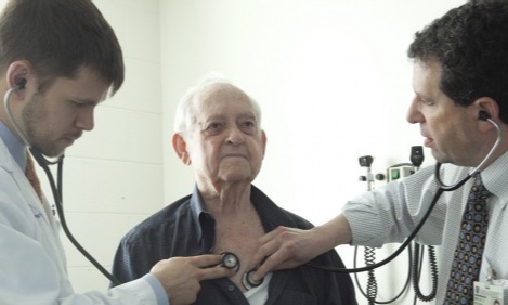
Recently clinicians in Duke Primary Care (DPC) were given opportunity to attend faculty development sessions designed specifically to strengthen clinician-educator skill sets for learners in the primary care office or urgent care setting. These were directed by Dr. Bruce Peyser, professor of medicine in the division of general internal medicine.
Many are new educators
While DPC has a number of providers who are experienced with teaching learners, many are relatively new to this process. Dr. Peyser designed the sessions to address gaps to the challenge he believes all face – namely how to provide great care for patients while at the same time, providing an opportunity for learners to work with the attending and to have much hands-on experience evaluating and caring for patients in the primary care setting.
Currently Duke Primary Care has 300 clinicians teaching over 200 learners in their 40+ outpatient primary care offices plus 9 Urgent Care clinics. Years ago, Peyser tells us, only 10-20 providers wanted to teach and now there are many who are more comfortable with teaching. There are approximately 15 providers who have a learner with them each academic semester.
Feedback shows appreciation
Feedback informs leadership that the teaching efforts are appreciated by the students. Year-end evaluations from students rotating on family medicine, and each year, that the end of year scores and evaluations have risen significantly.
The students really want to come learn with us, and we honestly have more students than we have places to put them.
Bruce Peyser, MD
Snapshot of Instructional Agenda
Session 1
- Dr. Nancy Weigle shared that “Everything is a teachable moment”, giving students opportunities to participate in office procedures is a good way to teach as well as stay on time.
- Whitney Taheri, RN, CNIII shared her experience as a student in the midst of COVID-19.
- Leanne Owens PA-C shared the dos and do nots of working with PA students. What works well includes: Planning ahead by choosing the patients the student will see. Complex visits are great for observation. To help save time, you can take on role of the scribe. Set time limits and debrief often.
- Conclusion: discussion session on microaggressions in the clinic
Session 2
- Dr. Denise Pong shared how to implement one-minute preceptor and SNAPPS in the clinic.
- Dr. Robert Drucker shared his talk on “Millennials, Generation Z as viewed by Baby Boomers”, appreciating impact of generational differences on learner behavior.
- Drs. James Smith & Bindi Shukla focused on teaching approach in Urgent Care and unexpected settings. In emergency scenarios, categorically give a clear identified task to your learner to engage them for hands on experience instead of having them shy away. Also –“Give the student permission to be wrong!”
- Dr. Peyser shared fruitful feedback techniques, recommending clear, specific, frequent feedback and avoidance of generalizations.
 The perception as gaged by feedback is that providers themselves are gradually more comfortable and more adept at teaching. DPC anticipates offering these development sessions at 6-months intervals. The next one is planned for April 2021.
The perception as gaged by feedback is that providers themselves are gradually more comfortable and more adept at teaching. DPC anticipates offering these development sessions at 6-months intervals. The next one is planned for April 2021.